- Home
- Craig Lancaster
The Fallow Season of Hugo Hunter Page 18
The Fallow Season of Hugo Hunter Read online
Page 18
“Eagles are gonna be really good this year, maybe the best in Class A. Need a story for the football section.”
If you take on eastern Montana by way of Interstate 94—and you really should exhaust all other possibilities for your life before you do—you’re likely to be taken in by the illusion that you’re pressing on in a straight, unyielding line. With the exception of a few scrubby buttes and river-crossed badlands, the route is clear to the horizon.
That’s the illusion. The fact is that the road unrolls north and east, in rough parallel to the flow of the Yellowstone River. Knowing this does little to stem the narcotic dullness of the drive, but I suppose it salves the soul a bit. There’s more wonder nearby than finds its way to your optic nerve. Sure, you’ve still got to get where you’re going—for me, on that particular Wednesday, it was a little boomtown on the Montana edge of the biggest domestic oil play going, 260 miles from the sun-kissed warmth of Lainie’s bed—but at least you can be content that something’s out there. Rattlesnakes and irrigation ditches and verdant fields and shattering solitude, but something. Something besides you and the road and the odd car passing you in an inexplicable hurry and the truckers opposite you headed for Billings and Bozeman and Missoula and, blessedly, Seattle.
I’d made two calls the night before. The first, to Sidney football coach Barry Brill, had told me that I’d need to thread the needle between two-a-day practices, and that’s why I was on the road at five a.m. while my love snoozed back at her house. The second, to a cell phone number that Raj had given me earlier that day, told Hugo to expect me the next evening. We agreed to meet in Williston, just forty-five miles from where I was staying.
In Miles City, the midpoint of my drive, I’d veered off the highway for a couple of Egg McMuffins and a tanker-sized cup of coffee. Something was up with my appetite. There was no pretending that it wasn’t so, not anymore, not as I fought every morning to get my jeans above the centerline and my protruding gut pushed hard at my shirt buttons. You could make the argument that I needed the weight; my doctor certainly had, ad nauseam, over the years. My inveterate smoking habit had made a hollow-chested freak out of me, but it had also served the more noble purpose of tamping down my appetite. I was swinging the other way now, headed for fat, happy, pink-lunged land.
Nearly eighty miles on, I swung off the interstate at Glendive and picked my way straight north, where the Yellowstone jogged toward its meet-up with the Missouri. The scoria-scarred badlands fell behind me, the river held me tight on the starboard side, and I made steady progress into a fertile valley ruled by sugar beets. I’d been born in Montana, raised here, never left for any extended amount of time, and this country always surprised me. It’s the Montana nobody thinks of—no mountains, no deep, cold lakes, but still starkly beautiful, with horizons that stretch in all directions. It’s a hard land shaped by hard people, and those austere families who made their stands here have reaped the bounty, first in agriculture and now in oil. The countryside crawled with land men, up to their necks in paperwork in the county courthouses as they researched mineral rights, and myriad were the modest farms that now sported telltale rows of holding tanks and the masts of oil rigs reaching for the sun. People here knew about booms and busts. They built their lives around them, either riding high or riding out. Now, with the technological changes that allowed rigs to tap into pockets of oil previously unreachable, by drilling sideways into the giving earth, some people said this wasn’t just another boom but the fundamental reconfiguration of a region.
As the highway dumped me out into the wide arms of Sidney, Montana, I couldn’t say that I disagreed with that assessment. On every corner, it seemed, a new motel took shape in wooden frames and Tyvek. Clumps of dried mud covered the road, the leavings of the big trucks that came through at all hours, all day. I’d read the alternating accounts, the joyous recitations of the money and people pouring in and the grim outlook for such basics as wastewater treatment and bridge maintenance. Jobs and cash multiplied and beckoned, and unknown faces appeared with greater frequency. Restaurants had no end of customers and no source of labor, what with the paychecks being greater in the patch. Coffers filled and crime flourished. At every turn, a trade-off.
I checked my watch. 9:37. I had a coach to find and a story to mold. I turned off the main road and plunged in.
37
In Williston, I found Hugo at a corner booth in a bar down on Riverside. He stood up and hugged me, then gave me a little faked uppercut to the melon. “You gotta keep your chin tucked, Mark.”
He looked good. The same. He was outfitted in Carhartts and chambray, a cap pulled low on his head. He looked like most of the guys in the bar—hard-edged, rugged, the kind of guys who’d have grease in the wrinkles of their knuckles. It was only if you looked a little closer that you’d see the differences. Age had made bank on Hugo’s face, leaving a road map of crags and gullies. Gray hairs threaded the black at his temples. The buddies who’d brought him to the bar—Hugo pointed them out at the blackjack table—were his son’s age. Hugo carried every one of his years. Those guys had a hungrier look about them, a wilder look.
I sat down. “You doing OK?”
“Just been a few days, but yeah. It’s fine.”
“What have they got you doing?”
“Cleaning.”
“You serious?”
“As a heart attack,” he said. “That’s the job. Keep the rig clean. Twenty-eight bucks an hour to scour with a scrub brush.”
“Unbelievable.”
He pointed at my eye. “That what Frank did?”
“Yep.”
“Did it hurt when he hit you?”
“I don’t remember.”
I said it as Hugo took a draw on his beer, and he nearly spat it out laughing. “Frank’s an old dude, but he’s mean. You probably should have started with someone closer to your own size.”
“He probably shouldn’t have sassed my lady.”
Hugo set the beer down. “You guys on the outs over this?”
“Me and Frank? I don’t know. We’ve survived worse things.”
It was another of those things I said as a tossed-off line, only to see it hit Hugo like a dart. I grimaced.
“I guess everybody’s pretty disgusted with me,” he said.
“I haven’t talked to anybody but your son, Hugo, but I doubt it. You know how it is. People just want you to find something and stick with it. They want you to be happy, contented. Same thing they want for themselves.”
“I know.”
“So why this?”
He tipped the bottle again. “I don’t know. It’s good pay, and there’s a lot of work. It got me out of Billings. I think that’s probably good. There wasn’t a lot for me there. But the big thing is Amber and that kid. I love them. I really do. I gotta show her I can be counted on.”
“Sounds like that part and the bit about getting out of Billings are in conflict.”
“Yeah, maybe.”
“Did you tell her how you feel?”
“She won’t talk to me.”
At last, a harried server swung by the table. I ordered a Jack and Coke.
“Maybe she will,” I said. “Maybe if you show her you’re serious.”
Hugo fixed me with a hard look, something meant to convince but also to intimidate, and it worked on both levels. “I am serious,” he said.
We talked through dinner and beyond. I nursed my drink, not wanting to fall too deep into the bottle with a drive back to Sidney still in front of me. Hugo cut himself off at two beers and stuck to water, and that impressed me perhaps more than anything else.
Our twenty-plus-year history provided us with conversational shorthand. While we tended to go deep on current events and percolating dramas, our ventures into nostalgia skipped from subject to subject like a flat rock across a pond. And it was there, in the folds of memory, t
hat I would always rediscover why I liked Hugo so damned much. If you shook loose the burdens of any given moment, or the frustrations of dealing with his idiosyncrasies, he was what he’s always been: an engaging, interesting, fun guy.
I filled him in on life with Lainie, how I was getting to know her son. I’d been a little hesitant to get close to Tony, near as he was to Von’s age. I don’t know. It sounds irrational, but I worried a bit that letting him into my heart would somehow supplant my own son’s hold on me. But then he welcomed me, and I saw how funny he and Lainie could be when they got together, completing each other’s sentences, arguing over fine details, expansive with their love for each other. I told Hugo that I was defenseless against their charms.
“Reminds me of my mom,” Hugo said.
“Yeah? She was funny?”
He ran a finger along the rim of his empty beer glass. “Not like a comedian. She had kind of a devilish sense of humor. Warped.”
I kept my mouth closed, hoping he’d go on.
“This one time,” he said, “her and Grammy were fighting about something, and Mom went into the yard—it’s late fall, early winter, no snow on the ground, the grass is all brown and cracked—and she grabs a couple of handfuls of grass and comes back in clutching the side of her head.
“Grammy’s all, ‘What’s wrong?’ And Mom goes, ‘I can’t take it anymore,’ and she throws the grass all over the house like she’s pulled her hair out, and Grammy starts screaming.”
“Holy crap!”
“I know,” Hugo said. “The look on her face. Oh, man, it was so choice.”
“What were they fighting about?”
He looked at me, blinking. “I don’t know. What difference does it make?”
“I was just wondering.”
“That’s not the point, Westerly,” he said in mock indignation. “The point is what Mom did. Are you looking to cause trouble?” He couldn’t help it. A smile turned up the corners of his mouth.
I smiled and backpedaled. “No, no, of course not.”
“You sure? Because I’ll give you some trouble. I’ll take you up to Knuckle Ridge.” He held up a fist and shook it faux-menacingly at me.
He sputtered and then laughed, and so did I.
God, it was such a great night.
Just before ten, Hugo’s buddies came around the table to collect him. Hugo brokered the introductions, and I shook hands with Jeff, who’d lost his ass at blackjack, and Sean, who’d taken down nearly $400 in winnings.
“I can take you back if you want to stick around,” I told Hugo.
“Nah, we’re in a man camp in Stanley. You’d be driving away from where you’re headed. I’ll be back home in a couple of weeks, and I’ll see you then.”
“It’s really no trouble.”
“Next time,” he said.
I pulled him in for a hug. There was no reason to fake a journalistic distance anymore. That all seemed like it had happened to two other guys—younger guys, with more in front of them than we had now. I released him, and Hugo threw another mock punch, our eternal routine. I shook hands with his friends again, and then they were gone, out the door. The server came around with the tab, and I paid it and left.
Outside the bar, the air was restless, thick with late-summer humidity. The monster that Williston had become never slept. The city lit up the night. I’d noted the growth on my way in: the fresh roadways, the influx of chain restaurants, oil holding tanks, rail cars that went on forever, the smell of new money. In a parking lot full of tricked-out pickups, I found my forlorn little sedan, and I fired it up for the drive that would send me back into the stillness and the dark, into a land measured by Lewis and Clark, who had no way of imagining the frontiers they trod upon, how discovery would still shape this place two centuries later. Discovery and displacement. The Native Americans, then the white man, then the land men, and now and forever the almighty dollar. Opportunity is a matter of perspective, I suppose.
I hit a straightaway and sped up. An adequate bed and a minibar awaited me in Sidney, but all I wanted was to hit the rack and hasten the arrival of morning. Perhaps it’s folly, at my age, to wish away any of the hours I’m given, but that night, in that place, all I could think about was getting home to Lainie. Hugo’s declarations for Amber had touched me, and I found myself wishing hard that he could find a way to her, that he was truly serious about being a man for her. I hoped that he really felt about Amber the way I felt about my girl.
I’d been alive too long and had seen too much to believe in soul mates, as least in the way that romantic notion is packaged and sold in our culture. The idea that there’s one girl for one guy, and all you have to do is suffer through all the many wrong ones until you find her or him, is just an endorsement of fairy tales. We need all kinds of people to get us through life. It’s too hard without them. I sliced through the hot night in my car, and I thought of those who had sustained me. My parents. Marlene, even when things were bad. Von. Gene freaking Trimear, for God’s sake.
And Lainie—sweet, sweet Lainie. She would be falling into bed in Billings now, curling up into the cotton sheets, and I was four hours away, and that just wasn’t right.
I was going to have to marry that girl.
Excerpt from Hugo Hunter: My Good Life and Bad Times
I’ve given love five times in my life:
To my mother.
To Grammy.
To Seyna.
To Raj.
To cocaine.
I would give anything to have my mom and Grammy back. I would give anything to have done a better job as Seyna’s husband. I would do anything for my son.
I would do more than that for cocaine.
Even now. Even today. Daily, I go to a meeting and admit to myself and others the power it holds over me. I talk about it because that drags my addiction into the light and makes it a real thing for me and those around me, and it forces us to deal with it. I don’t want to be alone with it. I don’t want to hide it. That’s when it makes real trouble for me.
The drug had its hooks in me the first time I tried it. Love at first snort. All I knew was that I wanted more, immediately, and as much as I could get my hands on. It was euphoria—out of control, endless cartwheels, everything-is-electric euphoria.
I also knew I was in big, big trouble.
And I was. I am. I will forever be.
38
I made it back to Billings by noon Thursday, fueled by gasoline, coffee, and Swedish Fish. With a few necessary stops, I had the supplies I needed, and I was in Lainie’s house by two. She had left me a note on the counter and some lasagna in the fridge, and I took measure of my time.
I could do this.
The first part was easy. I sat down with my laptop and did what I’d done thousands of times before, taking quotations and statistics and names and shaping a story out of them, wolfing down bites of lunch between flurries of keystrokes. It wasn’t high art. It never had been, really, and I certainly held no illusions about that now. Expository paragraph, quote, expository paragraph, quote, lather, rinse, repeat. That’s how you knock out a sports story. Gene Trimear wouldn’t mind, and neither would the Sidney Eagles.
I had more important things to do.
Once the article headed off to Trimear’s e-mail in-box, I checked the time again. 2:53. Next, I put a bottle of pinot grigio in an ice-filled salad bowl—I didn’t have time for the finer presentation touches—and plucked rose petals free to spread through the house.
3:26.
I doffed my clothes and climbed into the shower. Scattered as I was, I gave silent thanks that I’d remembered not having underwear at Lainie’s and had swung by my place to fetch a pair. Otherwise, I’d be stuck in the ones that had just traveled nearly three hundred sweaty miles or I’d be going commando: equally unappetizing possibilities.
Out of the shower,
I looked at my face in Lainie’s bathroom mirror, and I saw the valleys cut into it by the dribbling out of time. The thing is, I looked better, healthier, happier than I had in a long time. And I was. The cheeks that had been gaunt and drawn a year earlier were chubby and hale. I smiled, a big, goofy grin that didn’t make me self-conscious in the least. I couldn’t have erased it if I’d tried.
3:48.
For the first time in my life, I confronted a problem borne by a fat person. I couldn’t get my damn cummerbund to stay where it belonged. I’d suck air in, pull it up, breathe out, and feel it slip toward my hips. And then I’d repeat the exercise.
Cuff links, too, presented what the kids called a first-world problem. I leaned into Lainie’s dresser with my left arm, turned the palm up toward me, and tried to wrangle the works with my free right hand. Failing that, I got my teeth involved. Finally, I had the link in and switched arms and fought through the maneuver again.
Sweat beaded on my upper lip and my brow, and I could feel it pooling in the small of my back. Damn my bright idea of doing this on one of the hottest days of the year.
At last, I wriggled into my rented tux jacket, and the bedroom became a sauna. I took it off again and set it on the bed. It could wait till the last possible second.
4:23.
I sat on the couch and pushed the ring box to the center of the coffee table. The guy at Montague’s said I had exquisite taste. That may be true—I rather liked the single stone in a simple platinum display—but I think he was just happy to get the credit account.
I pulled back the box and opened it, then shoved it back to the table’s center.
I retrieved it, closed the box, stood and stuffed it into my right pocket, and sat down again.
Up once more, I carried it to the kitchen, opened the box again, and set it inside the refrigerator. I closed the door.

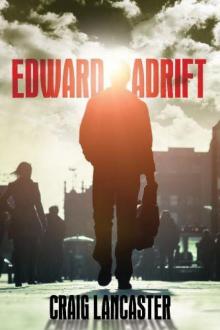 Edward Adrift
Edward Adrift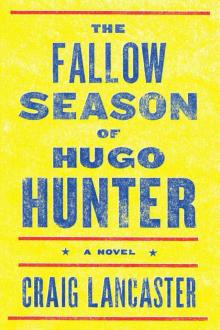 The Fallow Season of Hugo Hunter
The Fallow Season of Hugo Hunter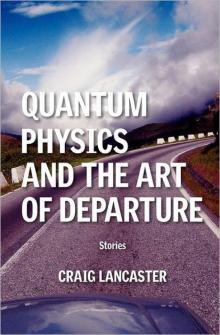 Quantum Physics and the Art of Departure: Short Shories
Quantum Physics and the Art of Departure: Short Shories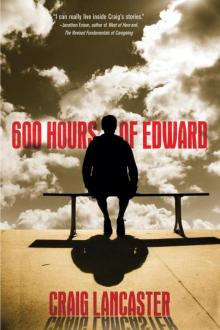 600 Hours of Edward e-1
600 Hours of Edward e-1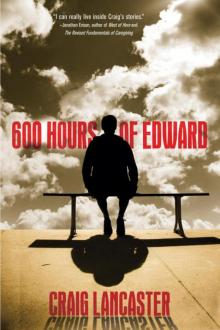 600 Hours of Edward
600 Hours of Edward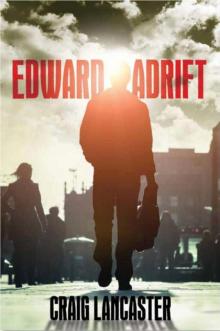 Edward Adrift e-2
Edward Adrift e-2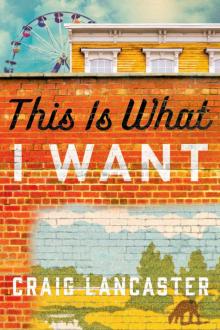 This Is What I Want
This Is What I Want